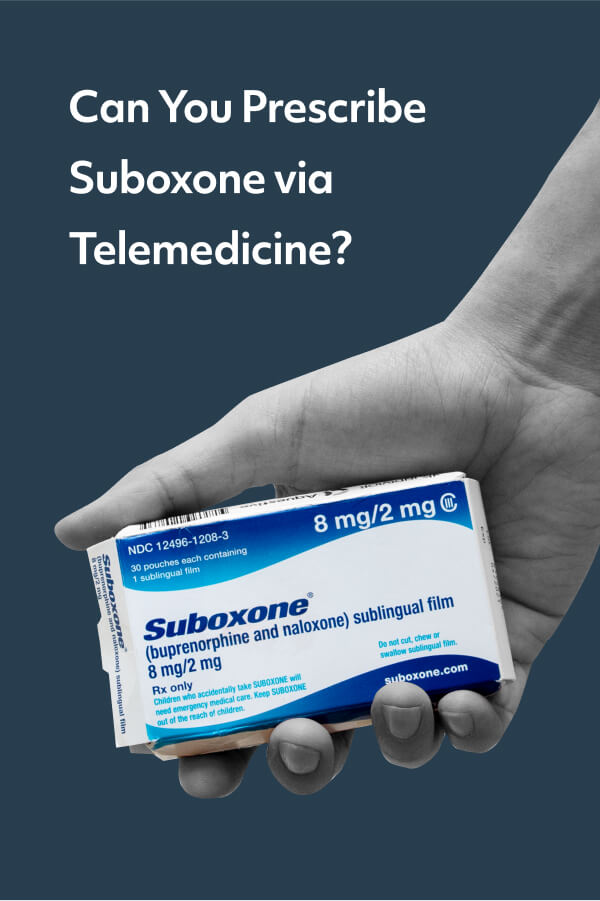The short answer to this question is yes. You can access medication-assisted treatment via telemedicine. However, it is important to know what is involved in Suboxone treatment so you can determine if telemedicine or in-person appointments with a healthcare provider will best meet your needs.
What is Suboxone?
Suboxone is the brand name for buprenorphine/naloxone. Buprenorphine is one of only three FDA-approved medications for opioid use disorder. This medication works in the brain by binding tightly to the opioid receptors in the brain. It is a partial agonist, which means that doesn’t fully activate the opioid receptors in the brain. Instead of creating a greater “high” at larger doses, like many opioids, its effect plateau. We call this plateau a “ceiling effect.” Because it binds to and stimulates the opioid receptors, it reduces cravings and helps to stabilize recovery. And because of the ceiling effect, it is unlikely to lead to erratic use and risky behavior.
Buprenorphine is the gold standard treatment for opioid use. It helps to combat the opioid crisis and decreases the risk of overdose deaths.
Learn more: How does Suboxone work?
Can a medical practitioner prescribe Suboxone via telemedicine?
As we mentioned above, it is possible to receive a prescription for buprenorphine or Suboxone treatment via telehealth. There are two caveats, though. The first is that not every healthcare provider is allowed to prescribe buprenorphine. They first have to take the training determined by the Substance Abuse and Mental Health Administration (SAMHSA) so that they can receive a special waiver to prescribe it. Even when they have the waiver, they are restricted to a certain number of patients on Buprenorphine and Suboxone.
The second caveat is that before 2020, the Ryan Haight Act meant that doctors were required to see patients in person to prescribe buprenorphine for opioid use, as it is a controlled substance. When the COVID-19 pandemic lockdowns kept Americans from getting to their providers, the DEA announced pandemic telehealth flexibilities that changed the requirements for practitioners so they would be allowed to prescribe buprenorphine via telehealth. This telehealth policy is still in effect through at least the end of 2024.
All medical practitioners who complete an 8-hour DEA training about prescribing controlled substances can prescribe buprenorphine, including providers who operate via telehealth.
So it is currently both legal and medically ethical for clinicians who have the proper training and waivers to prescribe buprenorphine via telemedicine.
Key facts: Treatment via Telehealth
- Defining telehealth: Telehealth or telemedicine simply means “healing from a distance.” More specifically, telemedicine is the use of technology to make virtual access to treatment. You’ll be able to access interactive medicine, exchange medical information between providers, and remotely monitor your vital signs like heart rate and blood pressure.
- Services available: There are a range of services available via telehealth, such as addiction treatment, behavioral health support, and virtual consultations with your care providers.
- Digital addiction treatment: Telemedicine for addiction treatment offers innovative and user-friendly approaches for the treatment of substance use disorders—such as computerized screening, telephone-based recovery support, telehealth therapy, virtual appointment reminders, and mobile apps—while still safely treating patients who need medication-assisted treatment.
- Improves access: Virtual healthcare provides an opportunity to reach patients who have limited access to these much-needed medical services, such as patients rural Ohio or the Michigan Upper Penninsula. Telehealth is also helpful for people in urban areas with poor public transportation, those with medical conditions that limit their mobility, and those who have work or family responsibilities that make it hard for them to get to a provider’s office regularly.
- Benefits: Telemedicine features many of the benefits of in-person addiction treatment, allowing a medical provider to monitor patient progress, make medication adjustments, and offer digital therapies. These services may include digital addiction courses, online counseling and group therapy, medicine prescriptions, and virtual addiction treatment.
Workit Health’s telemedicine-based Suboxone treatment program
Workit Health provides an innovative online Suboxone clinic. Our evidence-based telehealth program is able to reach a greater number of patients who would otherwise be without care. Workit Health delivers personalized treatment to individuals in varying stages of opioid use disorder. We know that behavioral health support can be an important addition to MAT, so we offer online recovery groups and include a behavioral health team member in Shared Medical Appointments. In addition to the online curriculum, Workit Health care teams are available via in-app messaging and are caring, nonjudgmental people dedicated to supporting folks in recovery.










